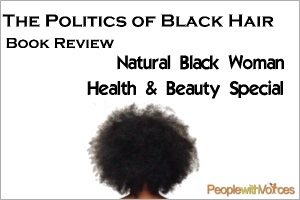Book Review: The politics of black women’s hair by Althea Prince
This book offers a refreshing insight into the politics surrounding black women’s hair and a moving collection of writings from women across the African Diaspora, sharing their histories and personal experiences.
The author does not go over already trodden ground by repeating the history of black hair (Hair Story by Byrd and Tharps) but instead focuses on conveying the sometimes physical and frequent emotional pain that black women suffer over their hair.
At the beginning of the book she does however, highlight some of the deeply offensive and racist depictions of afro textured hair, such as ‘Topsy’ a character in Beecher Stowe’s book Uncle Tom’s Cabin who was described as having “woolly hair” and the ‘Golliwogg’ featured in The Adventures of Two Dutch Dolls and a Golliwogg who had “shoe-polish black skin, large red lips and thick, unkempt woolly hair.”
Such depictions represent racist caricatures of people of African descent with exaggerated features which served to dehumanise black people whilst silently reinforcing whiteness as the yardstick by which all beauty is measured.

A glimpse into the author’s own childhood experience of having her natural hair groomed sets the tone of the book. Her busy mother who had four other children did not have enough time to devote to the daily maintenance of her daughter’s hair, so outsourced the task to a neighbour’s older child.
The result was a daily dose of pain and torture with the comb serving as a weapon to the scalp in an attempt to untangle a web of knots. This was compounded by the extreme pulling of the hair whilst plaiting it so tight that she developed a rash around her face and neck.
Other stories highlight the desperation of young black women to fit in with their peers who succumb to the pressure to straighten their hair; while some secretly harbour a desire to wear their hair natural but dare not do so for fear it will affect their career prospects or their love life.
For example, a 22-year old university student from Toronto writes:
“A lot of women feel that natural hair wouldn’t attract a man. When they say ‘I’m going to get my hair done,’ they’re not going to get natural braids, they’re going to get a weave, or straightening hoping that they’ll attract somebody.’”
Whilst a mother of two daughters explains:
“The only drawback with wearing my hair in a low afro in Austin, Texas, is that black men do not appreciate women with their hair this short. On more than one occasion, I have been asked to grow it back or been told outright that I am not attractive with my hair this short.”
Amidst the personal hair stories are snippets of information that serve to highlight why black women’s hair is a political issue whether they intend it to be or not.
For example, in 2006, television Divorce Court judge Mablean Ephraim was axed, when after losing all her hair and wearing wigs for a while, she left her hair natural when it started to regrow. Fox Network insisted that she continue to wear the wig, which she refused to do.
And Republican congresswoman Cynthia McKinney, who has worn her hair in braids and natural styles was once said to resemble “a ghetto slut” by white radio show host Neal Bortz.
This book drives home the fact that whilst the sixties era of afros sported by the likes of Angela Davis, Stokely Carmichael and later the Jackson Five, represented the ‘Black is Beautiful,’ mantra, promoting natural afro textured hair and resisting European hegemonic standards of beauty, that is no longer the case.
In the 21st century, relaxers and weaves have become standard practice for the majority of black women. This has created social and cultural problems in that those who straighten and weave their hair are unwittingly contributing to the normalisation of European standards of beauty.
So when black women choose to wear their hair natural, even though it is the hair they were born with, they are seen as 'non-conformists', less attractive, and a whole host of meanings that may not apply are inferred on black women. As the author explains:
“In some instances, women who wear their hair in its natural form are assumed to be radical, or at least progressive, and maybe a lesbian. On the other hand, women with straightened hair are often assumed to be conservative.”
It is hardly surprising then, that so many black women choose the route of least resistance and succumb to hair straightening and weaves. But it is heartening to see that in recent years there has been a resurgence of women who are deciding to wear their hair natural.
Whilst those considering going natural will instinctively turn to books on hair care to help them get started, The Politics of Black Hair is also essential reading. It not only offers political insights into afro textured hair, but in highlighting black women’s experiences and opinions can help to change perceptions and encourage more women to accept and love their natural hair.
ISBN 978-1-897178-87-4
Published March 2010
Publisher Insomniac Press


I am definitely going to get both of these books! They will surely help with my project. *whispers prayer of thanks* So blessed to come across this page 😀